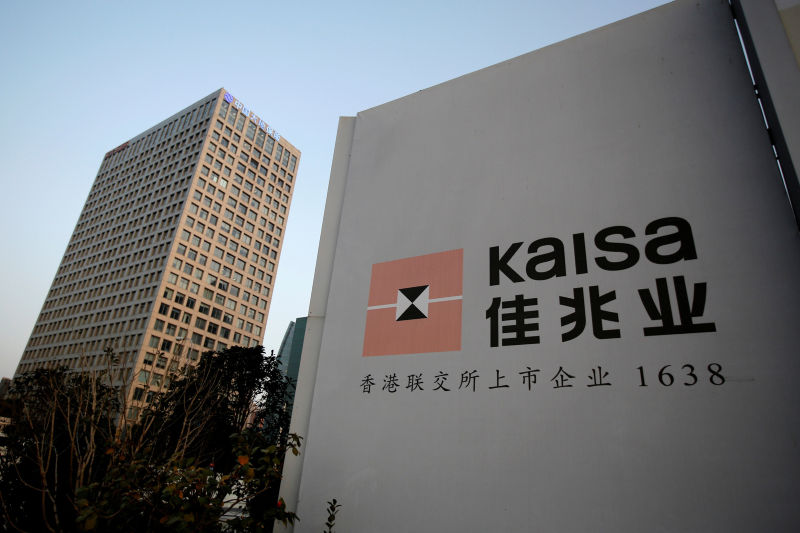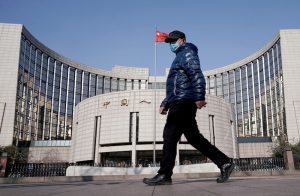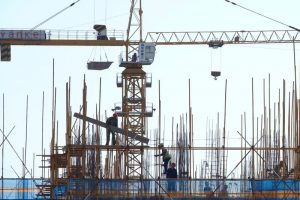Chinese developer Kaisa Group Holdings looks unlikely to win bondholders’ approval to extend the maturity of a $400 million bond due next week, analysts say, heaping more pressure on other indebted peers.
Kaisa’s proposal to delay the maturity of the bond by 18 months comes against the backdrop of growing creditor concerns about Chinese property developers’ ability to meet their near-term offshore repayment obligations.
Some developers called on regulators in late October to extend their offshore bond maturities or undertake a debt restructuring, as a growing number of defaults hit the sector.
Kaisa’s struggle in getting a much-needed lifeline from its creditors will also weigh on other smaller developers that are looking to avoid long and messy litigation and restructuring processes, analysts said.
James Wong, portfolio manager of GaoTeng Global Asset Management Ltd, said that for Kaisa, a debt restructuring is “quite certain”, as the threshold of passing the bond maturity extension proposal was too high.
“Investors are waiting for that day (of restructuring) to come” he said, adding smaller Chinese developers will continue to struggle.
Kaisa needs at least 95% of its bondholders to approve a proposal to exchange $400 million, 6.5% offshore bonds due December 7 for new notes due June 6, 2023, at the same interest rate.
The firm, which became the first Chinese property developer to default on its dollar bonds in 2015, has said its notes exchange offer will expire 4pm London time on Thursday unless it extends or terminates the proposal.
Nam Thai Setback
Meanwhile, Kaisa suffered another setback in recent days.
News emerged on Wednesday that Kaisa had lost control of Nam Tai Property Inc in an “epic revolt” by shareholders who voted to eject six Kaisa-appointed directors and replaced them with executives nominated by IsZo Capital Management, according to the South China Morning Post.
Nam Tai is a New York-listed property affiliate involved in the development and operation of technology parks with land in Shenzhen and Wuxi.
Kaisa owns a 24% stake in Nam Tai but has faced a battle with minor shareholders since May 2020 who accused Kaisa of “fiduciary mismanagement and business strategies that hurt shareholders’ interest”, the SCMP report said.
The company has yet to comment on the Nam Tai boardroom defeat, which has added to the developer’s woes at a time when it is fighting desperately to clear its debts.
Kaisa is the second largest US-dollar bond issuer among China’s property developers after the Evergrande Group, once China’s top-selling developer and now at the centre of the country’s property sector liquidity crisis.
Signs have emerged in recent days of Kaisa’s exchange offer getting knocked back.
At least one group of Kaisa bondholders had rejected the offer, according to a letter sent this week by their financial advisor to the Kaisa board and a copy of which was reviewed by Reuters.
Short-Term Liquidity Crunch
“The group believes that the terms of the exchange offer are unacceptable and illustrate an unwillingness on the part of the company to consider more appropriate and holistic ways to address Kaisa’s current short-term liquidity challenges,” the letter said.
The group of bondholders mentioned in the letter sent to Kaisa offered a ‘forbearance period’ to the company to delay the repayment to continue negotiations.
The bondholders, who say they own 50% of the debt Kaisa is trying to exchange, have offered $2 billion in fresh debt funding to the Chinese firm to help it avert a default, two sources with knowledge of the offer said.
The exact details of the funding size or terms for the offer were not disclosed. The sources could not be named due to confidentiality constraints.
But there had been little interaction between Kaisa and the group since the offer was presented to the Chinese developer, the sources said.
Kaisa did not immediately respond to a request for comment.
‘Downturn to Continue’
China’s property downturn is expected to continue into the first half of 2022, with home prices and sales falling as tight credit policies and a looming property tax dampen demand, a poll showed on Thursday.
Average home prices are estimated to fall 1.0% in the first half of 2022, according to 14 analysts and economists surveyed by Reuters from November 26 to December 1.
For 2021, home prices are now expected to rise 2.6%, down from a forecast of 3.5% in the last poll and following a gain of around 4.9% in 2020.
“The downward trend in home prices has emerged” due to tight quotas on home loans, worries about a property tax and weak demand, said Chen Shen, an analyst from Huatai Securities.
On the demand side, property sales by floor area are forecast to slump 16% in the first half of 2022, compared with a 27.7% rise in the same period this year.
The expectation for the supply-side is also gloomy, with property investment seen dropping 3.0% in the first six months of 2022, versus a 15% rise in the first half of this year.
“New homes may see a phased fall in prices and sales by volume” following the announcement of the list of cities implementing real estate tax testing, Huang Yu, vice president of China Index Academy, a Beijing-based property research institute, said.
- Reuters with additional editing by Jim Pollard
This report was updated with further details on December 2.
ALSO READ:
























